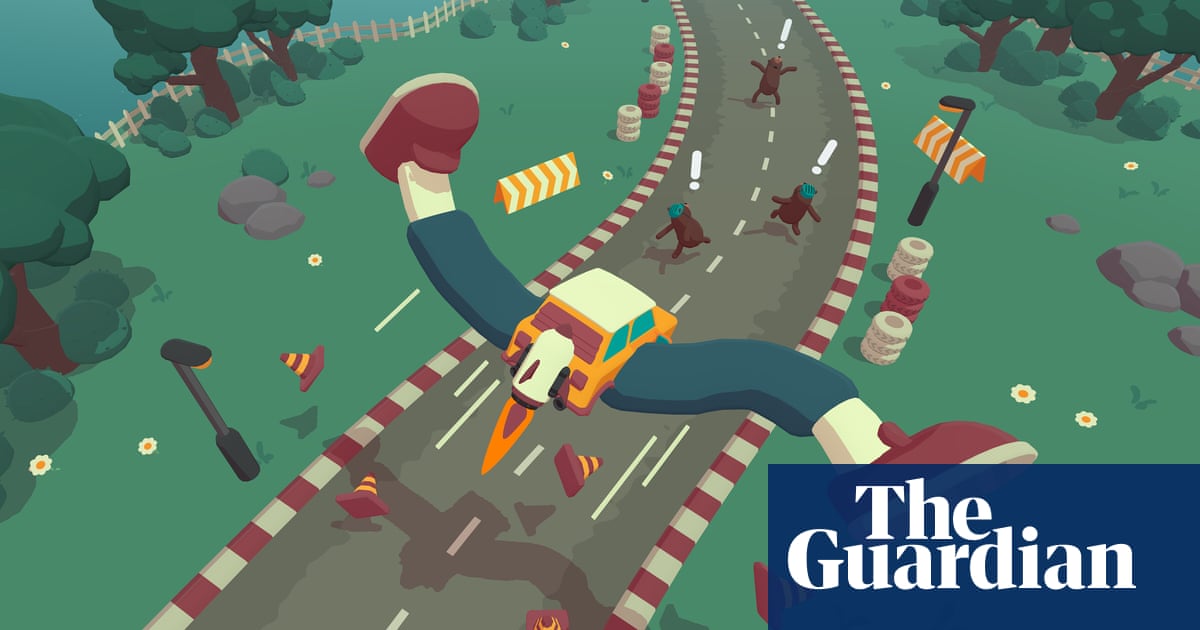Imagine a new racing video game. Whatever you’ve pictured, What the Car? is not it. In a world where racing games pride themselves on the ever-increasing detail and authenticity of their driving experiences, pushing the speedometer towards realism with cutting-edge game engines as well as perfectly simulated motor ones, this is the opposite. This car is literally running around on foot.
Described as “an absurdly silly adventure full of racing, laughs, and surprises,” What the Car? has you playing as a car with legs, sprinting and climbing through obstacles each more daft than the last, to get to the finish line. “Not a single person in the team owns a car, or even likes cars,” says Tim Garbos, the game’s creative director at Copenhagen studio Triband.
“That might seem wrong when we’re making a car game, but it has enabled us to naively misunderstand all sorts of things about cars.”
As well as ambling around on two legs, this car can play table football. And chop vegetables. It’s still a racing game, technically, but it’s best to think of this as a madcap mini game collection. Each of its hundreds of levels requires a different challenge to reach the end-point, from paragliding, to playing football, to becoming an accordion to stretch your wheels across crevasses.
Unsurprisingly, this not-so-racing game does not count Forza, Gran Turismo or even Mario Kart among its influences. Instead, the Triband team cite the adventure worlds of The Legend of Zelda and Super Mario 64, and there are flashes of Katamari Damacy amid the chaos (when your car grows too many legs you tumble around the track like a ball). “The ever changing format of the game is great when you are inspired by all the things,” adds Garbos.
A version of this game was originally released on Apple Arcade last year, and won a Dice award for best mobile game. The PC version has been expanded and will continue to get monthly updates. Another addition is a full level creator, giving users the ability to build and share their own wacky worlds, which Garbos hopes will be approached in suitably nonsensical style: “People will make some absolutely terrible levels and force their friends to play them.”
The studio has previous experience in revving up the humour, in the form of cult hits What the Golf? and What the Bat?, in which you have baseball bats for hands. “As a studio we focus on comedy games and when you build a joke, you start by setting up expectations, usually by providing some mundane background – and then you subvert them by doing something different,” Garbos explains.
As other successful parody games such as Goat Simulator have shown, there is an art to creating beautifully dumb work. How does Triband strike that balance, exactly? “A complete disregard for any realism, car fans, and actual vehicles, but also a strong focus on making a great experience as a whole. Sometimes, we just need the car to have bigger legs, be able to fly, or swim – and then we make that happen… [but] while we do have stupid simple laughs, it also needs to work as a game. It needs to bring hours of playing time. That takes time and dedication.”
Games can be great at comedy, especially physical comedy – think of Octodad, Gang Beasts, Untitled Goose Game, and indeed any game where a character hilariously glitches through the scenery. What the Car? joins the recently released Thank Goodness You’re Here! and the forthcoming Baby Steps among games that are actively trying to get a laugh out of us this year.
“I do think comedy as a genre is underrepresented in video games compared to, for example, TV,” says Garbos. “We’re pretty serious about comedy. When you want to make someone laugh, you have to start with yourself. If you can find it funny or ridiculous then you’re on the right track… Personally, I love showing the game to people and seeing their eyes light up at the jokes as they try to hide a small laugh. That’s the reason I make video games.”
I can’t help but wonder what will get the absurdist Triband treatment next. “We’re just getting started,” teases Garbos. “We are considering making a parody game of most mundane well-known things… including newspapers.”

